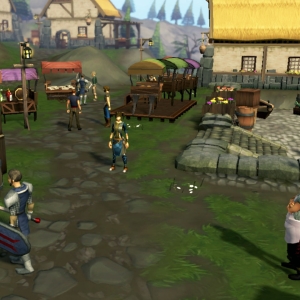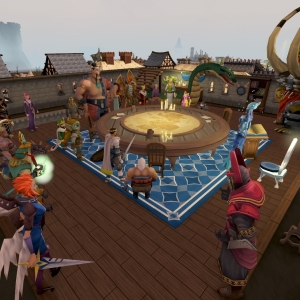New members of OSRS Farming is often one of the most daunting skills to dive into. What do I need to know before starting? What can I do? Why do my crops keep dying?? Don't fret if you're facing issues with it. Many people don't know how the skill works and are hesitant to broach the subject. If you're looking for the answer to what farming patches are, why they're different, or where you need to go to get the correct one, you're on the right track! In this week's article, we'll take a look at OSRS Farming Patches The Farming skills basics, and where to go to obtain the farming patches you need.
What's Farming?
For starters, what's farming all about? The farming skill allows a player to plant seeds in order to harvest into profitable objects. There are numerous varieties of seeds, but they all can be categorized according to one of eight types: allotment, flower herb, hops tree, bush, fruit trees, and special plants. Each of these types of crops has patches that are exclusive to that kind of seed - scattered across the globe of RuneScape. There are exceptions to this rule. are flowers, which are able to be grown anyplace and are also special crops each with its own individual areas for development.
In addition to planting the appropriate area for each kind of seed, different seed types have unique needs. For instance, tree seeds must be combined with pots for trees to create saplings before they are planted. Allotment seeds require 3 types of seeds to grow one plant. Furthermore, some types of plants may be prone to disease, but that's a topic for another guide. For now, just know that in order to grow varieties that are worthy of your time, you'll want to do some study into the requirements for each type of plant as well as other costs that each kind of plant can incur before you place a large amount of gold in the seeds you plant.
Important Considerations
Before you start farming, the other element to think about in your crop selection is the length of the growth cycle, and how much time you'd really like to dedicate to cultivating. They don't go out of business once they've reached their maximum size, so it is possible to return two months or two weeks later to harvest your crop if you wish to, however the majority of players take part in "crop sessions" every often to increase their income and grow their farming skill more slowly. If you'd like to do weekly crop runs every few days or even a week then you'll benefit more out of longer-growth time crops. However, if you are able to play for hours or more in a day, you might want to make several runs each day and shorter-term crops.
As a related topic, you'll want to consider your mobility capabilities. If you're a regular player with a lot of access to the telegraph, fairy rings, diaries and high agility that means you'll have an easier time taking more patches, and doing so quickly - on each crop run over a lesser level player that might need to spend longer moving between patches or maybe even only utilizing one patch at a. If you're a player who has only enough time to use one patch, you'll be in better shape.
After you've chosen your crops and settled on the time investment you're prepared to make it's likely that you'll be thinking "where do I need to be going?" Well, the answer depends on which kind of crop you're looking to cultivate. Each crop will have five patches for farming, available throughout the game. Generally, your strategy should be to find a group of several semi-accessible patches and crop corresponding to each that you can complete your crop runs quickly and move on to other activities. The patches for farming are listed below, according to the order of early-game content to the end of game content.
OSRS Farming Patches
Allotment - Herb
South of Falador
Catherby
North or Adougne South of Fishing Guild
West of Port Phasmatys (East of Canifis)
Fantastic Kourend
Harmony Island
Troll Stronghold (North of Trollheim) Only Herb This patch is completely immune to disease! However, it will require you to complete the My Arm's Big Adventure quest
Hops
Lumbridge Chicken and Cows, on the way to Varrock
Northwestern Seer's Village
Yanille
South-western portion of Entrana
Bush
Champions Guild, south of south-western Varrock mine
Outside Rimmington
South of Ardougne Near the Monastery
Etcerteria
Tree
West of Lumbridge, in forest outside castle walls
Taverly
The Varrock Castle
Falador gardens
Gnome Stronghold
Fruit Tree
Brimhaven, just south of the docks
Catherby, immediately adjacent to the exit of the Ice Mountain trail. Catherby is directly adjacent to the exit from the Ice Mountain
East of the Tree Gnome maze
Inside the Tree Gnome Stronghold, north of the Agility courses
Lletya
This may seem like a lot, but when you map them all on an image, you will be able to identify some areas of concentration which even players at a lower level could make use of without putting in too much time. If you're not planning to spend all of your time wandering between farms and you're not required to utilize every patch. For the novice farmer, you can actually get by with your home-Lumbridge-teleport.
Lumbridge Teleport
Tele home to Lumbridge West out of the castle walls, and make a stop at one of the initial Tree patch in the Lumbridge forest. Continue west towards Rimmington making a stop there at the Allotment patch just across the street and south to Falador (at the farmhouse). Continue west until Rimmington, hitting the Bush patch. Turn north until Falador. Visit the garden patch located to the north of city, making use of the bank, if you'd like. At this point, it's your decision whether to move north and west across The Ice Mountain toward Catherby, where two other farming areas await the brave (Allotment, Fruit Tree) or you can turn to the East and proceed to Varrock. In Varrock you'll get inside Varrock Castle and get to the Fruit Tree patch. Then, turn south and go to two more patches of Bush and Hops patches on the way return to Lumbridge.
Final Thoughts
Hopefully, you've enjoyed this OSRS Agriculture Guide! There's a more complicated strategy as you advance to higher levels and you begin working the gp/hour/hour rates but there's plenty to work with for the average farmer who has other things to do in the game and off!




